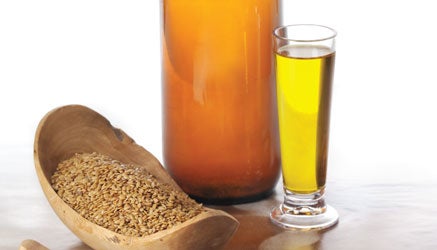Healing Foods: Flaxseeds

In ancient Egypt, flax was considered a gift from the gods for the abundance it provided. The waist-high crop yielded stems that could be spun and then woven into linen and fishnets.
Physicians in ancient Greece used flaxseeds as a remedy for inflammation and intestinal troubles; and now researchers are shining a bright light on what ground flaxseeds can do when incorporated into your diet (grinding unlocks the benefits).
For starters, ground flaxseeds show promise as a treatment for constipation and irritable bowel syndrome. In 2003, the journal Nutritional Genomics & Functional Foods published a study in which subjects with constipation-predominant irritable bowel syndrome who were given ground flaxseeds suffered significantly less constipation, bloating, and abdominal pain than those taking psyllium fiber.
Flaxseeds have also been credited with reducing cholesterol levels. When 55 postmenopausal women with mildly elevated cholesterol were given 30 grams of ground flaxseed daily for three months, their total cholesterol shrank 7 percent and LDL (bad cholesterol) 10 percent, according to a study conducted at Oklahoma State University. Study leader Edralin A. Lucas, PhD, believes flaxseeds’ high fiber is responsible. “Soluble fiber lowers cholesterol by increasing the excretion of bile,” she says. “Bile is synthesized from cholesterol, and more utilization of cholesterol leads to lower blood levels.”
There is evidence as well that consuming flaxseeds could help combat certain cancers. In a University of Toronto study published in 2005, recently diagnosed breast cancer patients who consumed 25 grams of flaxseeds in muffins daily for 32 days slowed their rate of cancer-cell growth by 34 percent. Similar reactions have been found in subjects with prostate cancer. A 2007 study from Duke University followed 161 men prior to prostate surgery. One-quarter of the men were randomized to normal care; one-quarter to a low-fat diet; one-quarter took 30 grams of ground flaxseed daily for an average of 30 days; and one-quarter combined the flaxseed and the low-fat diet. In the patients who took flaxseed, tumor growth was slower than it was in the groups not taking it. Lead researcher Wendy Demark-Wahnefried, PhD, RD, is exploring whether antioxidants in flax deserve credit for keeping the tumors in check or if pathways that deal with fatty acids and cell membranes play a role.
For vegetarians and vegans, flaxseeds and flaxseed oil offer plant sources of alpha-linolenic acid (ALA), which the body can convert to eicosapentaenoic acid (EPA) and docosahexaenoic acid (DHA), two omega-3 fatty acids. Because ALA conversion relies on an enzyme that can be less available or less active in certain people, the use of flaxseeds as a source of omega-3s has recently been contested. But research continues to suggest that flaxseed oil remains a worthy plant-based omega-3 alternative: an Emory University study published in 2006 in The Journal of Nutrition found that subjects given 3 grams of ALA from flaxseed oil daily for 12 weeks had a 60 percent increase in blood levels of EPA.
Getting a daily dose of flaxseeds is a straightforward matter of additions and substitutions. Flaxseed oil can go into salad dressings in place of vegetable oil, be drizzled over steamed veggies, or be mixed into cooked rice (avoid actually cooking with this delicate oil—high heat destroys its beneficial compounds).
The seeds are even more versatile: blend ground seeds into a smoothie, sprinkle over hot cereal, stir into yogurt, or add them to oven-baked items such as veggie meatloaf, bread, and muffins. Look for ground (also known as flax meal) or whole seeds, which you can grind in a coffee grinder. But perhaps the most innovative use of flaxseeds is as an egg substitute. Stirring 1 tablespoon of ground flaxseeds into 3 tablespoons of water yields a thick, slightly sticky mixture that can be used to replace one egg. For vegan cooks and for bakers looking to cut down on the fat and cholesterol of eggs, that use alone is a healthful godsend.
Supplement Savvy
What to look for: Flaxseeds and flaxseed oil both contain ALA and lignans, but ground seeds offer the added benefit of fiber. Look for raw ground flaxseed in the bulk sections of health food stores or supermarkets (or buy whole seeds to grind yourself). When shopping for flaxseed oil, choose a product that contains at least 8,000 milligrams ALA per 1-tablespoon serving. Also look for opaque bottles to reduce the risk of spoilage; skip products that have been diluted with other oils.
How to take it: Sprinkle 2 tablespoons of ground flaxseeds daily into your favorite foods, or take 1 to 2 tablespoons flaxseed oil daily with water. Start slowly with flaxseeds, advises Jane Reinhardt-Martin, RD. “Their high fiber content might cause gastrointestinal distress if you take a lot at first, so begin with 1 teaspoon daily and increase to 2 tablespoons over a few weeks.”
Safety: Supplement doses of flaxseeds are not recommended for pregnant and nursing women or those with a history of estrogen-sensitive cancers.